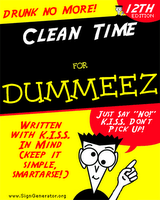
You can read Micky's post on his own blog, I have provided the link...(psst it's in the title)
I thought I should deal with this comment directly as a full blog post because it's a really excellent comment...
Here's the comment (I'm putting it here 'cos half the time people don't notice the comments section)
Here's what Micky said:
""A recent copy of Reader's Digest has a couple of articles on Alcoholics Anonymous. The crux of the articles is that the famous 12 Steps, don't work at all. Apparently, there's no data to support the claim that Alcoholics Anonymous is successful at getting people to stop drinking. From my own experience, the 12 Steps, shut down the critical thinking section of ones brain. What do you think? Comments are welcome!!
PEACE BE WITH YOU
MICKY""
What I think about this is:
I agree
and
I disagree, too
Rather - I believe that 'The Program,' when used with some common sense, is very VERY beneficial for those who choose to follow the 12 Step Principles.
I think that Micky is right, in a way, about 12-Step programs having the ability to "shut down critical the thinking section of ones brain." I have observed this in certain fellow-members, myself - there is NO DOUBT ABOUT IT!!! (I have been guilty of this, on occassion, during my early recovery-time, too - it was EASIER to just think in terms of 'slogans' during a time when I was learning to see the life through eyes that hadn't been clouded with drugs or alcohol for many years).
Don't take my words to mean that I am in total agreement with the comment, however, because I am not.
In a paragraph or so, what is considered to be a fairly reasonable set of principles for guiding ones actions in life - has been conveniently labelled and set into a certain narrow frame - that of '12-Step Programs Do This To People.'
Yes - 12-Step Programs can become very 'repetitive' and SOME PEOPLE can learn to rely very heavily on the kind of text (literature) that 12-Step Programs offer people. This can decrease their chances of 'thinking for themselves.' The way that 'The Program' is put forth, in general, it allows many people to become 'dependent' on 12-Step slogans, limitations, fellowship, etc., and, in fact, LEARN NOT TO THINK FOR THEMSELVES.
This, however, is not an indication of a problem with 'The Program.'
I believe that situations whereby people stop thinking for themselves and stop thinking 'critically,' are much more complex than just saying 'That's because of 12-Step in that person's life.'
Many, many more people are, with the utilization of 12-Step Programs, learning to think MORE CRITICALLY in many areas of their lives, because beyond a simplistic level, this is what 12-Step programs are really about...the clear messages in the 12-Step literature that I have read and learned are about HUMILITY (Not embarrassment), and learning to honour myself and my body in ways that I never knew how to do before when I used to drink and drug. Mainly, this means - "NO DRINKING OR DRUGGING," and if I happen to be having a day where my 'will' to remain sober and clean happens to be minimal and at a dangerously low level, I turn back to checking out the 12 Step Principles.
I am able to take a critical look about my actions, behaviors, attitudes and thoughts and not just run to a 12-Step meeting, recite slogans and such. I'm not the best 'spokesperson' of the program, according to many 'die-hard' followers, because I REFUSE TO NAG others about going to meetings, reading thier books, etc. The way that each person internalizes 12 Step literature and principles is very INDIVIDUAL, and I have no right to press on someone who doesn't want to look more critically and intensely at 12-Step principles and utilize their value.
I truly believe that if I rely on 12-Step so much that, on a steady basis, I HAVE TO BE AT A MEETING 'X' amount of times per week OR else relapse - then I am only acting upon 'The Program's' WORST ASPECTS...the very ones mentioned by Micky -
Thanks for the great comment post, Micky - it never hurts to QUESTION what our beliefs are, how we use the things we know, how we react to things in life.
After all - it's our BELIEFS that are important, right? They form our set of standards for ourselves, help us decide what our 'ethical make-up' will be. If our beliefs revolve around 12-Step principles, and we use these principles well, there should be little problem in the way that we live life.
If we use ANY principles wrongly, then we are lost, right?
Wouldn't this include - the principles of being a good psychologist or doctor or anything? A lawyer or even a general labourer can also stop using their critical thinking process. A lawyer may refuse to 'practice' business in new ways as modern world and business practices change. A doctor may refuse to believe in or may simply be unaware of a new medical breakthrough that occurs in our modern day, yet he/she is still following a set of 'sound principles' that has worked for years. The lawyer or the doctor may have stopped using their critical thinking skills to question their present principles...it happens in all kinds of situations, not just with recovering alcoholics - and not just with 12-Step programs.
Again, Micky, thank you for the comment - which has made me think very hard about how I would 'sum up' a definition of '12-Step Program.'
Ultimately, I cannot 'sum-it-up' nicely, but your comment made me realize how often we do attempt to sum up whole sets of principles all down to a few sentences - and then we also make judgments on those statements that result.
I hope to hear from you again!
teeray~~










